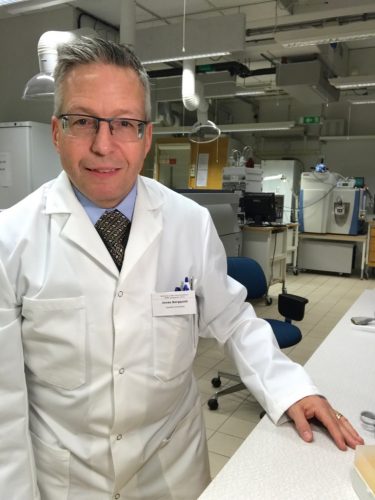We’re pleased to share a new publication by Jonas Bergquist, MD, PhD, and colleagues: “Comprehensive transcriptome assessment in PBMC of post-COVID patients at two years after a mild COVID infection reveals upregulation of JAK/STAT signaling and chronic inflammation.”
The Heart of the Matter
- The Director of OMF’s Collaborative Center at Uppsala, Dr. Jonas Bergquist, recently published a paper showing that molecular changes in peripheral blood mononuclear cells (PBMCs) of people with post-COVID support the idea that it is a chronic inflammatory disease.
- The study examined 50 controls and 60 people with post-COVID lasting over two years, and found 463 transcripts to be differentially expressed.
- The genes involved in these differences are connected to a persistent immune response and mitochondrial dysfunction. The JAK-STAT pathway, in particular, may serve as a potential therapeutic target to investigate in further research studies.
- This manuscript places the project in the “Publication” stage of the research process.
Comprehensive transcriptome assessment in PBMC of post-COVID patients at two years after a mild COVID infection reveals upregulation of JAK/STAT signaling and chronic inflammation
 OMF’s Collaborative Center at Uppsala, directed by Dr. Jonas Bergquist, recently published a paper on their work—in collaboration with the Science for Life Laboratory at Uppsala University—investigating molecular changes that occur in people with post-COVID lasting more than two years after a mild infection. Overall, the study found that these changes support the idea that post-COVID is a chronic inflammatory disease, with an upregulation of JAK/STAT signaling providing a potential avenue for therapeutic targets.
OMF’s Collaborative Center at Uppsala, directed by Dr. Jonas Bergquist, recently published a paper on their work—in collaboration with the Science for Life Laboratory at Uppsala University—investigating molecular changes that occur in people with post-COVID lasting more than two years after a mild infection. Overall, the study found that these changes support the idea that post-COVID is a chronic inflammatory disease, with an upregulation of JAK/STAT signaling providing a potential avenue for therapeutic targets.
This study specifically examined the gene expression profile in peripheral blood mononuclear cells (PBMCs) in 50 controls and 60 people who had a mild COVID infection between March 2020 and April 2022 with symptoms lasting for over two years. Participants underwent sampling and clinical assessments—including intensity of symptoms, physical and mental fatigue, depression and anxiety—over two years after their acute infection. Sixty-seven participants also did a mild exertion ergometer test to measure lactate concentrations in the capillary blood at baseline, after exertion, and after resting. Transcriptome analysis was also performed on mRNA and SARS-CoV-2 RNA fragments were analyzed with sequencing-based screening.
From their analysis, 463 transcripts were differentially expressed between people with post-COVID and controls. There was an upregulation of genes in the JAK-STAT signaling pathway—making it a potential therapeutic target—and other genes suggesting that there is a persistent immune response in people with post-COVID. Additionally, the team found a downregulation of genes that suggested there was mitochondrial dysfunction. Overall, there was no correlation with the severity of symptoms. Finally, the study team found increased lactate levels at baseline and during recovery after exertion when compared to the control participants.
No SARS-CoV-2 gene fragments were detected in the PBMCs, which suggests that if viral persistence plays a role in post-COVID, the reservoir of these fragments is located elsewhere. Alternatively, the signaling pathways that remain active as though they are responding to an acute infection are similar to what you would find in autoimmune diseases.
Given the release of this manuscript, the project is in the “Publication” stage of the research process.

Read the full paper in Frontiers in Immunology.
Accelerate Research for ME/CFS and Long COVID Through Research Participation
OMF StudyME is a free global recruitment tool that connects individuals interested in participating in research studies with the researchers conducting them. If you haven’t already done so, by signing up, you have the power to help researchers find answers for ME/CFS and Long COVID. The process is easy and takes less than five minutes.

